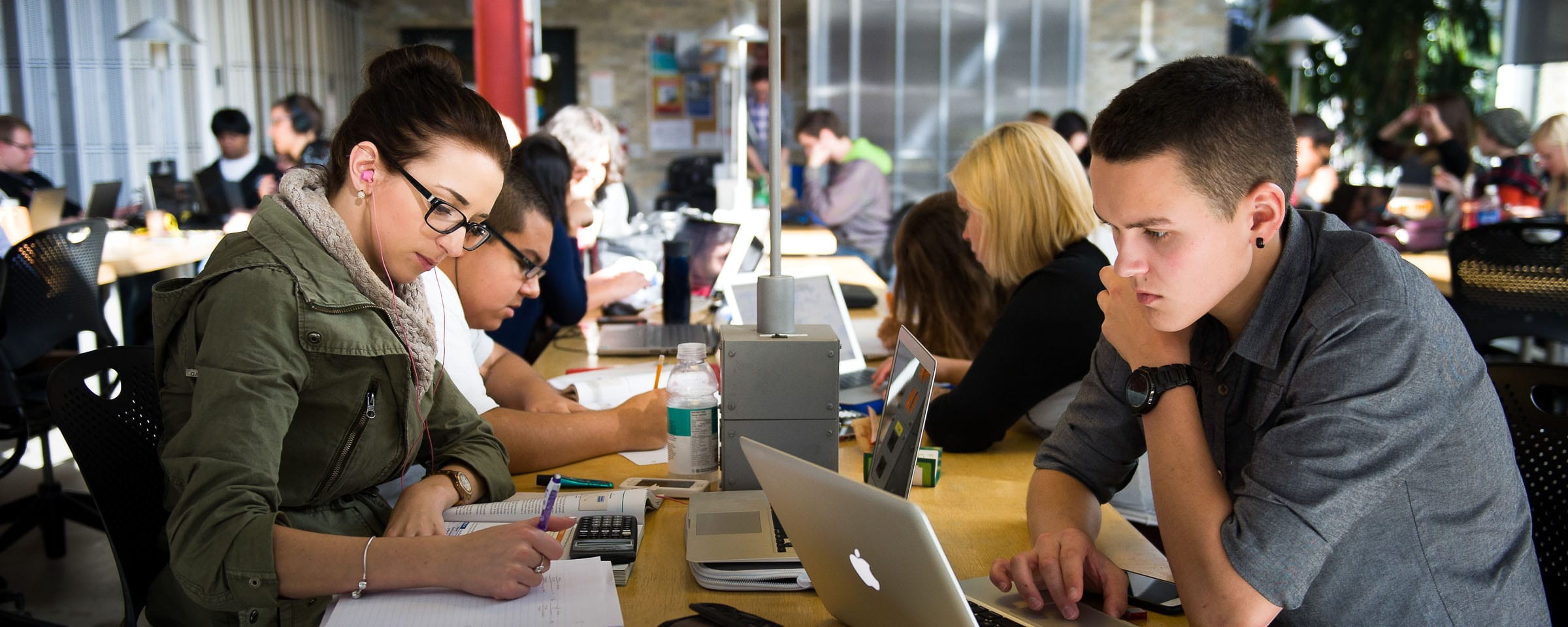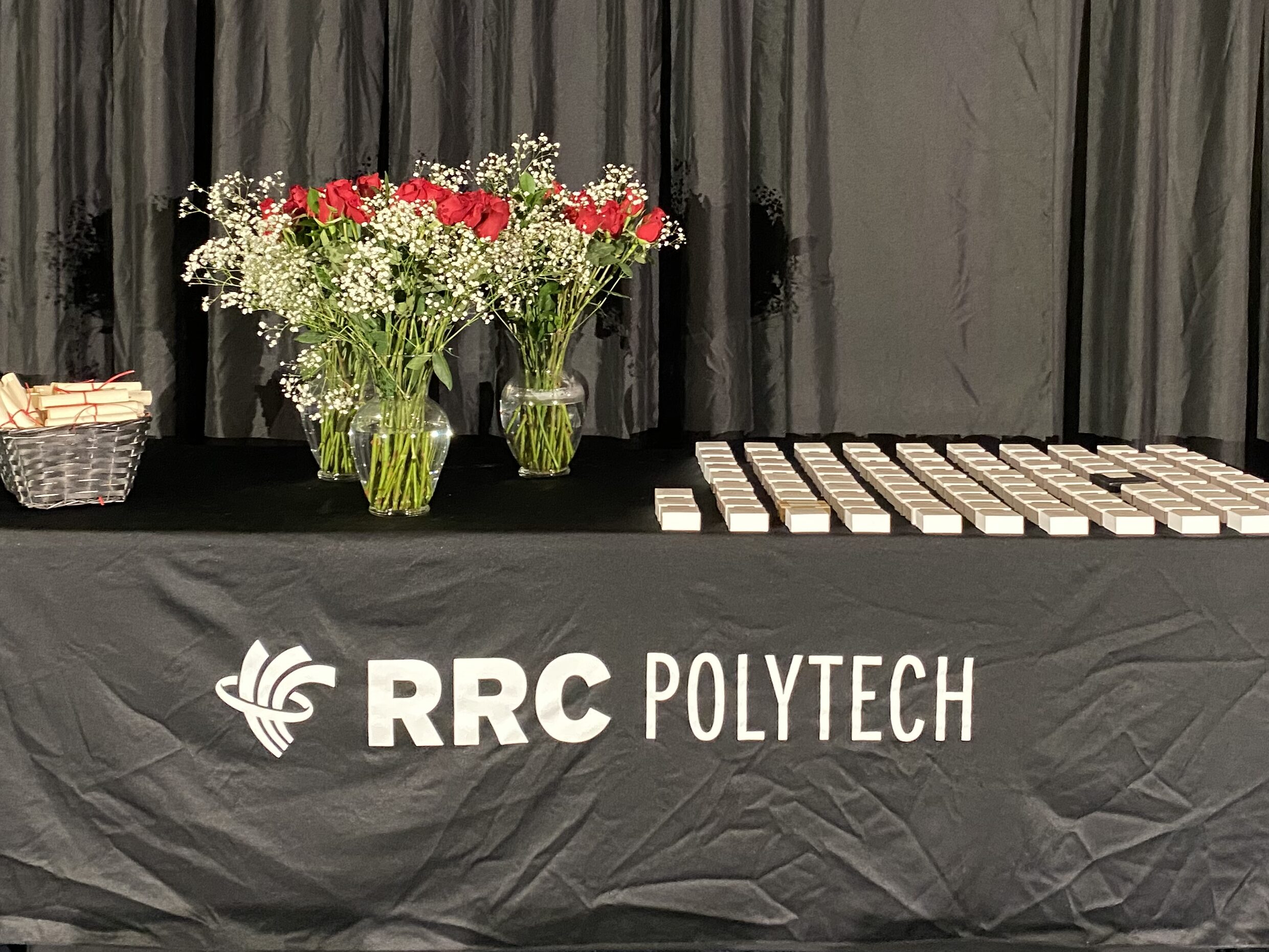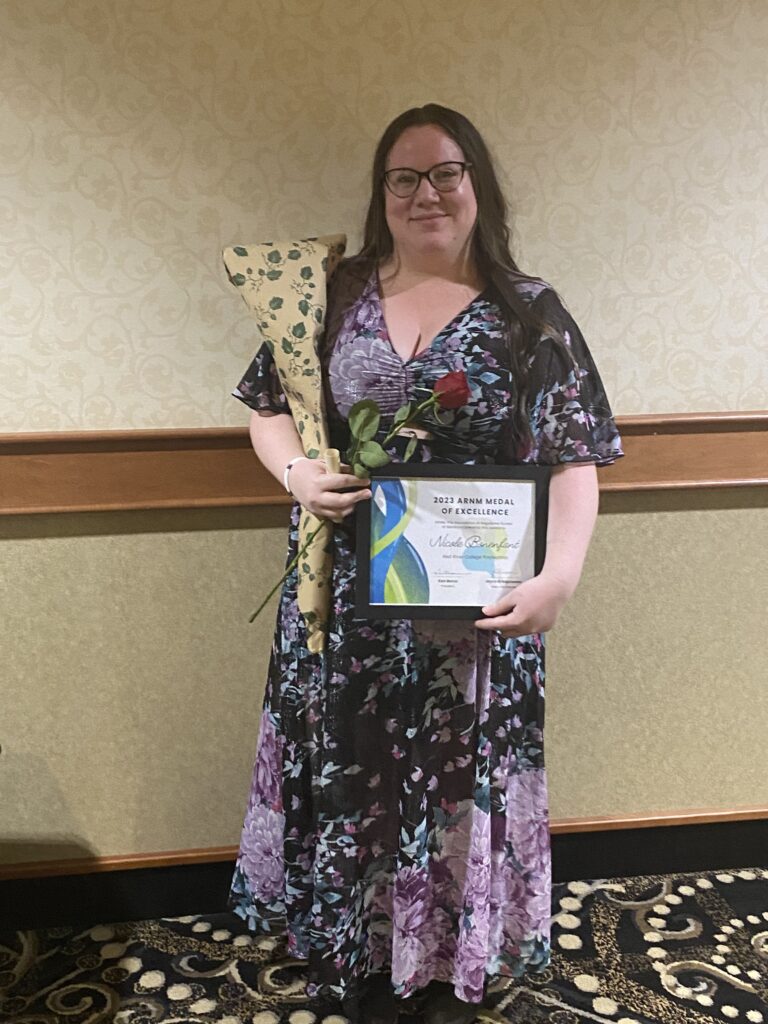2024 Spring Convocation – June 18, 2024 (Evening)
Tuesday, June 18 – 7:00 p.m. Ceremony
See photos from the convocation ceremony ›
Read More →
Posted: June 17, 2024
See photos from the convocation ceremony ›
Read More →Posted: June 17, 2024
See photos from the convocation ceremony ›
Read More →Posted: June 17, 2024
See photos from the convocation ceremony ›
Read More →Posted: June 17, 2024
See photos from the convocation ceremony ›
Read More →Posted: June 5, 2024
Congratulations to the awards recipients on their achievements — we wish all our students much success in their chosen fields!
RRC Polytech wishes to thank the donors of the awards, bursaries, and scholarships for their continuing support of our programs and students.
Read more to see the agenda and list of award winners.
Read More →Posted: April 5, 2024
Do you have a passion for teaching and inspiring others? Do you want to leverage your business or commerce degree? If so, our Applied Commerce Education program is tailor-made for you!
At Red River College Polytechnic, our Applied Commerce Education program empowers business/commerce grads to become the next generation of influential commerce educators. Help shape young minds and cultivate a deep understanding of business technology, finance, entrepreneurship, management and marketing.
After graduation from our program, you will be certified to teach in a K-12 Manitoba School with a specialty in Applied Commerce Education. This Senior Years (9-12) stream program prepares you to teach the 14 Manitoba Education Commerce courses.
For example, some of the courses that would provide the opportunity for credit transfer in the Applied Commerce teachable major include:
| 6 credit hours of Accounting | 3 credit hours in Finance |
| 3 credit hours in Introduction to Business | 3 credit hours of Business Management |
| 3 credit hours of Economics | 3 credit hours of Entrepreneurship |
| 3 credit hours of Marketing | 6 credit hours of Business software/technology |
Daryl McRae
Chair of Teacher Education at RRC Polytechnic
E: teachered@rrc.ca
P: 204.632.2300
Posted: December 5, 2023
Jean Burrows Scholarship – Sarah Wilding
Jean Burrows was chair of the Nursing Department from 1974 to 1998. Created upon her retirement, this award recognizes outstanding academic achievement for students at the end of the first year of the BN program.
Bernice Parrott Award – Tara Garrioch, Madi Harder, Natali Domozhyro, Carl Calaje, Al Estoesta, Madison Towle, Amber D’Aoust, Rafael Marante, Tessa Martin
The Bernice Parrott Award was established to provide financial assistance to a deserving
student after term six of the BN program. This award recognizes the hard work and effort
that all students put forth as they complete the requirements of the program.
Nursing Students Endowment Scholarship – Ciara Tutkaluk and Nicole Bonenfant.
These awards were established because of the foresight of students who in 1997 established
an endowment fund. Each student, as part of their tuition fees, contributes to this
endowment fund. In 2001, a portion of this money was dedicated to the creation of these
awards. Since then, the class of 2002 made a sizeable contribution from their own
fundraising efforts.
Nursing Legacy Award – Clinical Practice Year 1 – Holly Ling
– Clinical Practice Long term care – Nicole Hammersley
– Clinical Practice Medicine – Shannon Pickell
– Clinical Practice Surgery – Tiana Wyryha
– Clinical Practice Pediatrics – Riley Dodds
– Clinical Practice Mental Health – Riley Dodds
– Clinical Practice Palliative – Karren Ballantyne
– Community Clinical Nursing Practice 1 and 2 – Emily Giesbrecht
– Skills and Techniques 3 – Hannah Szeryk
– Health Assessment 1 and 2 – Maybhelle Santos
This award was established by combining donations from a number of sources.
The Stanton family, the Duncan family, and Phyllis Aaron along with the Nursing faculty have
made substantial contributions. The award recognizes outstanding clinical performance of
students from year one to year three of the nursing program. The Nursing Techniques 3
award recognizes a year one student who excels both in the academic course work and the
performance of Nursing Skills.
Thorey Johnson Nursing Award – Jonadave Arceta and Jordan Wurtz
In honour of their mother, Mrs. Johnson’s daughters have established this scholarship to be
presented to a nursing student who has expressed a special interest in rural nursing
practice. The recipient has demonstrated an interest in front line nursing work in a hospital
environment; a high level of skill in the clinical setting, sound academic achievement, and a
caring and compassionate attitude with patients.
Nursing Leadership Award – Joshua Salisi and Tiana Wyryha
This award is for deserving students who have gone above and beyond in support
and leadership of their peers. It was established by the Awards Committee, with
nominations from faculty and peers.
Discipline of Professional Nursing Award – Navreet Chahill, Ciara Tutkaluk and Trishia Malabuyoc
This award is presented to students for their outstanding achievement in the courses of Discipline of Professional Nursing 1-5.
Mary Langhan Nursing Award – Yonathan Mohamed
This award is presented to a 3rd year student who has demonstrated a high level
of skill in the clinical setting and has expressed a special interest in obstetrics and
gynecology.
Karla Ferens Memorial Entrance Award for Health Care Aide – Candace Mercredi, Jathniele Manucduc and Gursimran Kaur
The Karla Ferens Memorial Entrance Award for Health Care Aide was established
by family and friends in memory of Karla Ferens, a 2011 Red River College
graduate of the Health Care Aide program. The award recipient has displayed the
same accomplishments exhibited by Karla Ferens: Involvement in sports and
leadership qualities.
Community Service Award – Clarence San Jose and Gabrielle Verspeek
This award is presented to a second and a third year student who has volunteered
for a community agency while maintaining sound academic achievement.
Karen Wall Indigenous Nursing Student Award – Rachelle Fehr
This award is presented to a 3rd year student of Canadian Indigenous heritage
who has achieved academic success in the BN program, and has demonstrated
leadership and community service.
Elizabeth Scaife Memorial Award – Ana Beltran
This award is presented to a BPIEN (Bridging Program for Internationally
Educated Nurses) student who has demonstrated outstanding academic
achievement and demonstrated exceptional clinical performance.
Christiane Gabrielle Bonin Memorial Award – Yvonne Datzkiw
Jaime Manness: Hike Manitoba Nursing Award – Jade Friesen
This award is present to a second year student who exemplifies a love for hiking
and the outdoors with good academic standing. The award was established to
honor a RRC alumna and instructor who wanted to share her passion for
Manitoba’s wilderness.
Shannon Gray Memorial Award – Kaye Jeremie Aguilar
Kim Kotelo Memorial Award – Katie Laberge
Portage Mutal Insurance Award for Indigenous Nursing Student – Sophie Walker
Shirley (Perret) Loewen Indigenous Nursing Student Award – Rhonda Paoletti, Rachelle Fehr, Kiara Carpenter, Chelsea Wotton, Lexi Green-Monkman, Desiree Turner and Cassidy Webb
Shirley (Perret) Loewen Indigenous Graduation Bursary – Shania Dunn, Taylor Parker and Jessica White
RRC Polytech Students’ Association Be the Change you want to see Award – Karren Ballantyne
Eliza Cummings Machan and Helen Machan Memorial Nursing Award – Ryan Delaine
Written by Jennifer Johnson – Nursing Lab Manager
with descriptions of awards courtesy of the Nursing Awards Committee
Posted: November 6, 2023
A huge congratulations goes out to all of our 125 graduates this year!
It has been a rough road, but you did it! We as faculty couldn’t be prouder of each and every one of you for all the hard work and effort you invested in your future in the career of nursing.

The faculty would also like to congratulate the 2023 Gold Medal winner Nicole Bonenfant!!

Written by: Jennifer Johnson Nursing Lab Manager
Posted: October 25, 2023
Instructor Recruitment Event
Would you like to work at a place where you can make a positive, direct impact on the next generation of professionals in your field?
Learn about exciting employment opportunities for instruction and curriculum development in Information Technology at Red River College Polytechnic. Join senior academic leaders and faculty:
Date: Thursday, November 2
Time: 4:00 pm to 6:00 pm
Location: Manitou a bi Bii daziigae, Roundhouse, at 319 Elgin Avenue (view on Google Maps)
This event is free to attend. Resume is not required.
We have full-time, part-time, or contract employment opportunities.
Learn about the many benefits of being an RRC Polytech employee. We are looking for people with experience in information technology, application development, data science, machine learning, and security experience for the following programs:
Agenda
| Time | Activity |
| 4:00 pm | Tour of Manitou a bi Bii daziigae |
| 4:30 pm | Presentation on RRC Polytech employment |
| 5:00 pm | Breakout sessions for specific types of employment (full-time, part-time, contract) |
| 5:30 pm | Refreshments and networking |
Benefits of Employment at RRC Polytech
We offer competitive salaries, extensive benefits, and the opportunity for personal and professional growth in a rewarding career. We’re also one of Manitoba’s Top Employers, one of Canada’s Best Diversity Employers, and one of Canada’s Greenest Employers.
Please share information about this event with people in your network who may be interested in attending. Register to let us know you are attending this in-person event.
Posted: October 20, 2023

| Attention RRC Polytech Information Technology and Creative Arts Alumni and Industry Friends! Our current students would love your help. The Inspire Conference is November 7th, and our Networking Lounge needs industry friends and alums from BIT, CA/P, IST, BTM, DSML, InfoSec, Game Dev, Digital Media, Graphic Design and Film Production to answer questions from our current students. You likely remember the value of these interactions when you were a student, and recall how beneficial they were to you. If you have an hour or two to spare, please let Alan Simpson (asimpson@rrc.ca) or Connor Gilhuly (cgilhuly@rrc.ca) know by email as soon as you’re able to. Let us know if you prefer the morning or the afternoon. We will have tables open from 9am to 3pm. We hope to see you there! |
| @inspireconference2023 |
RRC Polytech campuses are located on the lands of Anishinaabe, Ininiwak, Anishininew, Dakota, and Dené, and the National Homeland of the Red River Métis.
We recognize and honour Treaty 3 Territory Shoal Lake 40 First Nation, the source of Winnipeg’s clean drinking water. In addition, we acknowledge Treaty Territories which provide us with access to electricity we use in both our personal and professional lives.